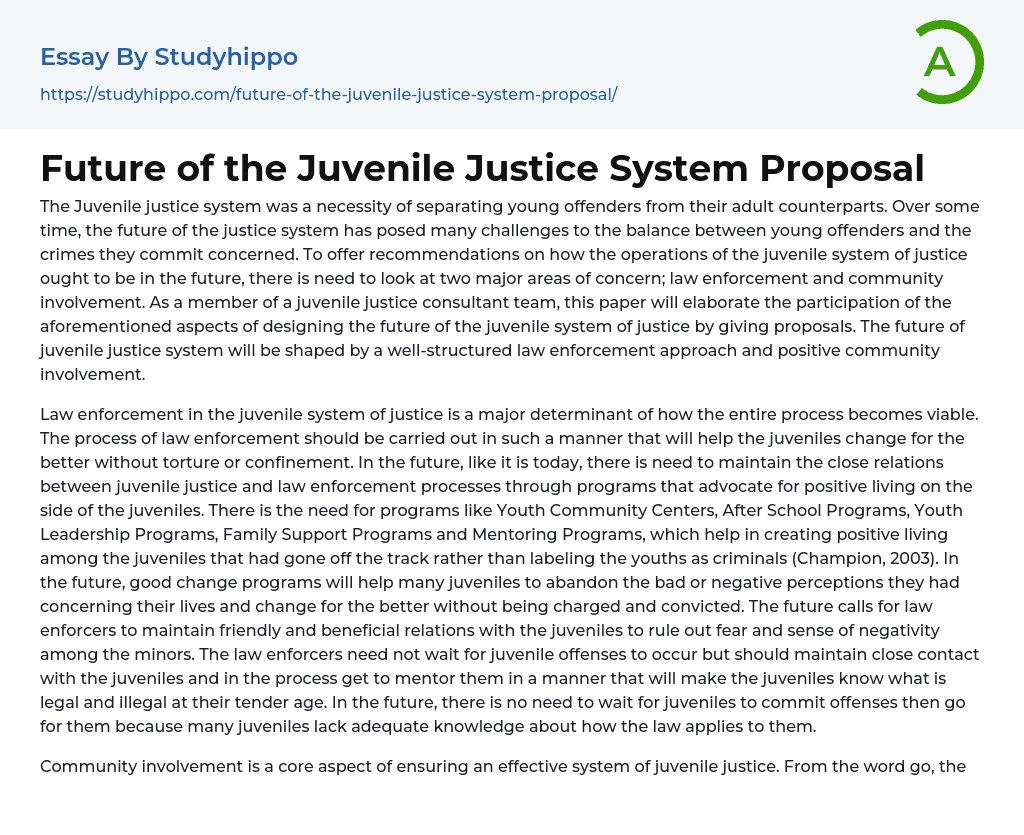The Juvenile justice system was a necessity of separating young offenders from their adult counterparts. Over some time, the future of the justice system has posed many challenges to the balance between young offenders and the crimes they commit concerned. To offer recommendations on how the operations of the juvenile system of justice ought to be in the future, there is need to look at two major areas of concern; law enforcement and community involvement. As a member of a juvenile justice consultant team, this paper will elaborate the participation of the aforementioned aspects of designing the future of the juvenile system of justice by giving proposals. The future of juvenile justice system will be shaped by a well-structured law enforcement approach and positive community involvement.
Law enforcement in the juvenile system of justice is a major determ
...inant of how the entire process becomes viable. The process of law enforcement should be carried out in such a manner that will help the juveniles change for the better without torture or confinement. In the future, like it is today, there is need to maintain the close relations between juvenile justice and law enforcement processes through programs that advocate for positive living on the side of the juveniles. There is the need for programs like Youth Community Centers, After School Programs, Youth Leadership Programs, Family Support Programs and Mentoring Programs, which help in creating positive living among the juveniles that had gone off the track rather than labeling the youths as criminals (Champion, 2003). In the future, good change programs will help many juveniles to abandon the bad or negative perceptions they had concerning their lives and chang
for the better without being charged and convicted. The future calls for law enforcers to maintain friendly and beneficial relations with the juveniles to rule out fear and sense of negativity among the minors. The law enforcers need not wait for juvenile offenses to occur but should maintain close contact with the juveniles and in the process get to mentor them in a manner that will make the juveniles know what is legal and illegal at their tender age. In the future, there is no need to wait for juveniles to commit offenses then go for them because many juveniles lack adequate knowledge about how the law applies to them.
Community involvement is a core aspect of ensuring an effective system of juvenile justice. From the word go, the community is part of the environment where the juveniles live. Actions of juveniles are well known to the members of the community in which the juvenile lives in. In this light, therefore, the community has to form close ties with law enforcing agencies like the police. There is a need to maintain strong ties to the community and such agencies. In the future, the community has to work with law enforcers to create positive attitudes towards juvenile justice administration among the juveniles. Findings have indicated that if the community exposed juvenile offenders to the law enforcers, with time the juveniles came to develop positive attitudes towards the justice system and did shun away from crimes as opposed to those who had not (Brick, Taylor & Esbensen, 2009). From this observation, the juveniles would become aware of crime prevention programs within the community and shun away from the
vice. The future calls for the community to be more involved in establishing a robust communication platform with the law enforcers and the juveniles. The community will have to observe the lives and actions of juveniles living among them and share any necessary information that can help foster good relations between the juveniles and their justice system.
References
- Champion, D. (2010). The juvenile justice system. Upper Saddle River, N.J.: Prentice Hall.
- Brick, T., Taylor, J., & Esbensen, F. (2009). Juvenile attitudes towards the police: The
importance of subcultural involvement and community ties. Journal of Criminal Justice.
- Animal Cruelty essays
- Charles Manson essays
- Crime Prevention essays
- Crime scene essays
- Criminal Justice essays
- Criminology essays
- Cyber Crime essays
- Damages essays
- Detention essays
- Distracted Driving essays
- Drug Trafficking essays
- Drunk Driving essays
- Forensic Science essays
- Gang essays
- Hate Crime essays
- Homicide essays
- Identity Theft essays
- Juvenile Crime essays
- Juvenile Delinquency essays
- Juvenile Justice System essays
- Law Enforcement essays
- Murder essays
- Organized Crime essays
- Penology essays
- Piracy essays
- Prison essays
- Property Crime essays
- Prostitution essays
- Punishment essays
- Punishments essays
- Rape essays
- Robbery essays
- Serial Killer essays
- Sexual Assault essays
- Sexual Assault on College Campuses essays
- Sexual Harassment essays
- Sexual Offence essays
- Stealing essays
- Surveillance essays
- Ted Bundy essays
- Victim essays
- Violent crime essays
- White Collar Crime essays
- Domestic Violence essays
- Gun Violence essays
- Media Violence essays
- Video Game Violence essays
- Violence Against Women essays
- Violence in Video Games essays
- Youth Violence essays




